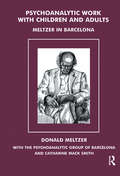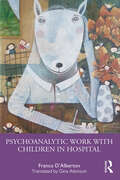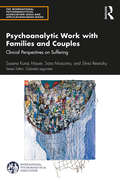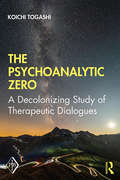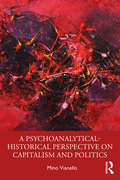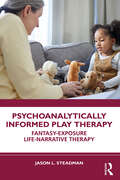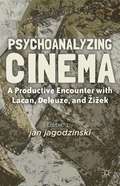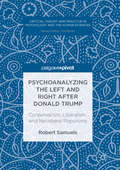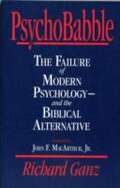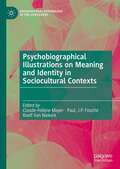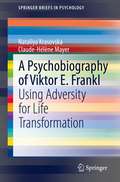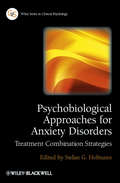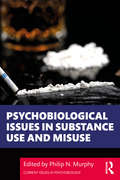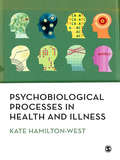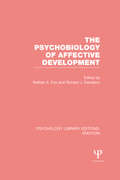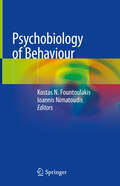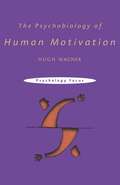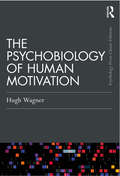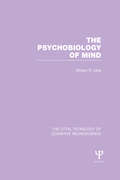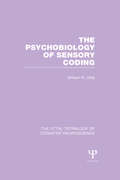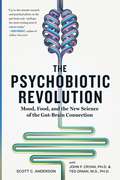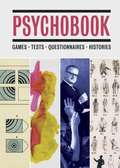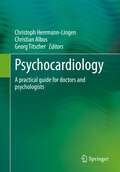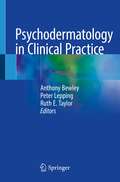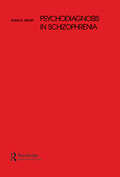- Table View
- List View
Psychoanalytic Work with Children and Adults: Meltzer in Barcelona
by Donald MeltzerThis volume is a collection of seminars and lectures the author gave to the Psychoanalytic Group of Barcelona under Dr Leon Grinberg, and later Dr Benito Lopez, during his visit to Barcelona. The clinical case studies outlined in the book address with typical variety the author's thoughts on clinical work with children and adults, and the numerous issues involved therein, including depression, jealousy, delusional omnipotence and perversion.
Psychoanalytic Work with Children in Hospital
by Franco D'AlbertonPsychoanalytic Work with Children in Hospital presents the experiences of a psychoanalyst working within a hospital paediatric department. It explores the possibilities for applying psychoanalytic theory when working with children in hospital and how it can be extended to include parents, caregivers, health care staff and volunteers. Each chapter of the book addresses an issue or area of professional experience that presented Franco D’Alberton with clinical or technical questions, outlining the core concern and then exploring his attempt to provide answers to these questions. This volume presents many possible applications of psychoanalytic theory in a paediatric hospital, encompassing issues encountered by health care staff and volunteers as well as by parents and their hospitalized children, such as physical pain, meetings and information sharing and group settings. It also describes therapeutic interventions directed towards both children and parents. This book will be key reading for child and adolescent psychoanalysts, psychotherapists, and clinical psychologists in practice and in training. It will also interest clinicians seeking to understand how psychoanalytic work can be applied in hospital and health care settings.
Psychoanalytic Work with Families and Couples: Clinical Perspectives on Suffering (The International Psychoanalytical Association Psychoanalytic Ideas and Applications Series)
by Susana Kuras Mauer Sara Moscona Silvia ResnizkyPsychoanalytic Work with Families and Couples rethinks the ways in which conflicts present today in psychoanalytic consulting rooms and the nature of suffering in family, couple, and sibling bonds. Based on two major concepts, that of device (drawn from the philosophers Foucault, Deleuze, and Agamben) and that of link (developed by Berenstein and Puget), the authors have developed new approaches to clinical practice with families and couples that focus on the complexity, singularity, and immanence of patient-analyst interaction in the session. In thinking about link dynamics, moreover, they go beyond the consulting room to reflect on how these dynamics develop in other spaces, such as institutions, organizations, and the fraternal circle of colleagues. Part I, Couples and Families Today, discusses changes undergone by families and couples in the last thirty years and their effects on psychoanalytic practice. Attributing a link logic to suffering and to the situations that condition it implies making significant decisions regarding our clinical strategy, our choice of a device and of an interpretive path. Faithful to the idea that the clinical dimension calls for transformations, the second part, Facing Clinical Challenges, includes clinical materials from manifold treatment devices that attest to changes both in contemporary paradigms and in the professional lives of psychoanalysts. Psychoanalytic Work with Families and Couples will be of great interest to all practicing psychoanalysts and psychoanalytic psychotherapists.
The Psychoanalytic Zero: A Decolonizing Study of Therapeutic Dialogues (Psychoanalytic Inquiry Book Series)
by Koichi TogashiThe Psychoanalytic Zero: A Decolonizing Study of Therapeutic Dialogues is written from the unique perspective of a Western-trained Asian psychoanalyst and applies principles of Eastern philosophy to understand the psychoanalytic relationship, psychoanalytic processes, and their uses—and limitations—for alleviating human suffering. Bringing a unique Eastern perspective to a previously Western-dominated discipline and framed within the current relational and ethical trends in psychoanalysis, the book enables readers to develop a language for understanding an Eastern ethical viewpoint and explore how this language can change our awareness of psychoanalytic practice and human suffering. Chapters are devoted to the Eastern concepts of nothingness, emptiness, surrender, sincerity, silence and narrative, and issues including existential "guilt of being," trauma, contingency, informed consent, the sense of being human, and uncertainty. Discussions are illustrated and illuminated through vivid recreations and careful elaboration of therapeutic case studies with traumatized patients. The studies demonstrate the process by which patients regain a sense of being human. This enriched perspective will, it is hoped, help the analyst treat traumatized patients who are unable to relate to others, and who do not experience themselves as being human. The Psychoanalytic Zero will enrich an analyst’s sensitivity to the appearance of the moment without context—the psychoanalytic zero—which opens infinite opportunities for continued growth in a psychoanalytic relationship. It will be of great appeal to psychoanalysts and psychoanalytic psychotherapists interested in self-psychological, intersubjective, and relational theories.
A Psychoanalytical-Historical Perspective on Capitalism and Politics
by Mino VianelloA Psychoanalytical-Historical Perspective on Capitalism and Politics explores how empathy once shaped the collective unconscious, before being replaced by rampant individualistic drive to power. Mino Vianello uses "radical federalism" to define a new approach to democracy, hoping for an end to the repetition of outdated political and economic ideals to solve the world’s democratic crisis. The book brings together a multitude of disciplines and perspectives, including Marxism, history, class, feminism, politics and empathy, to provide a comprehensive and honest history of power from the Enlightenment to the present day. This interdisciplinary study will be key reading for academics and scholars of Jungian studies, politics, sociology, history and economics.
Psychoanalytically Informed Play Therapy: Fantasy-Exposure Life-Narrative Therapy
by Jason L. SteadmanPsychoanalytically Informed Play Therapy: Fantasy-Exposure Life-Narrative Therapy is a structured manual for the execution of FELT, an integrative play therapy that marries the analytic, relational, and psychodynamic aspects of traditional Play Therapy with the scientific rigor and replicability standards of clinical empiricism.Jason Steadman’s FELT model creates a structured, empirically derived means of monitoring children’s play using psychoanalytic methods. Steadman’s method proposes the usage of story stems to structure play to address critical needs in children’s psychological development. In FELT, Steadman teaches readers how to identify problematic play themes and how to respond therapeutically to drive play and general child development toward healthy directions. Steadman uses anxiety as the primary example of psychological distress for FELT, but also shows how the method can be applied to many other pathologies, such as depression and trauma. Steadman explains 11 core FELT themes, which are then further condensed to three major clinical targets identified in the play of clinically anxious children. Each of these is described in detail in the book and therapists are shown not only how to reliably identify themes, but how to focus their interventions to move children toward major play-based targets. Integrating psychoanalytic theory with an emphasis on Object Relations, Steadman’s FELT program highlights the importance of the self in healthy child development and how play-based psychotherapy can be used to help children build stronger, healthier selves that can face a wide variety of psychological issues across their lifespan.Including comprehensive theoretical underpinnings and thorough clinical examples of FELT at work, this volume will allow therapists, clinicians, and mental health workers to understand childhood play in an empirically based manner and show them how to integrate the key tenets of FELT into their own work to better aid children experiencing anxiety and other mental health concerns.
Psychoanalyzing Cinema
by Jan JagodzinskiThe essays within this collection explore the possibilities and potentialities of all three positions, presenting encounters that are, at times contradictory, at other times supportive, as well as complementary. The collection thereby enriches the questions that are being raised within contemporary cinematic studies.
Psychoanalyzing the Left and Right after Donald Trump
by Robert SamuelsThis book outlines a new model for global social justice movements that is based on Freud and Lacan's central insights regarding the unconscious, repetition, drives, and transference. Since most of our current social issues are global in nature, Bob Samuels convincingly argues that we need a global solution, but that global solidarity is blocked by narcissistic nationalism and the capitalist death drive. In examining contemporary social movements for global justice, Samuels articulates a comprehensive theory of non-pathological social solidarity, and argues that in the age of multinational corporations and global climate change, we need a new model of global justice and government that requires an understanding of analytic neutrality and free association. This book uses psychoanalytic theories and practices to explain how someone like Trump can rise to power, and explores why liberals have failed to provide a convincing or effective political alternative. It will be compelling reading to students and teachers in a range of psychological and political disciplines, and to anyone interested in psychoanalysis and current politics.
Psychobabble: The Failure of Modern Psychology -- and the Biblical Alternative
by Richard GanzWhy is it many evangelical preachers shout from the pulpit about God's power, but they shuffle their emotionally troubled members off to the closest therapist? Both church leaders and laypersons seem to believe that the psychological "experts" have the answers for the wounded hearts and souls of God's people. And when churches do offer counseling, it often is tinged with the secular psychology and psychotherapy that have infiltrated the church. <p><p> Psychobabble explains the dichotomy between secular and Biblical counseling and shows the danger of incorporating secular techniques into a Christian approach. This book will arm believers looking for Scriptural answers to the hurts of a broken world. As anti-Christian bias becomes increasingly pervasive in secular psychology, the church must look to the true source of all healing. This book will point the way.
Psychobiographical Illustrations on Meaning and Identity in Sociocultural Contexts (Sociocultural Psychology of the Lifecourse)
by Claude-Hélène Mayer Paul, J. P. Fouché Roelf Van NiekerkThis book explores psychobiography with focus on meaning making and identity development in the life and works of extraordinary individuals. Meaning-making and identity development are existential constructs influencing psychological development, mental health and wellbeing across the lifecourse. The chapters illustrate through the eyes of 25 international psychobiographers various theoretical and methodological approaches to psychobiography. They explore how individuals, such as Angela Merkel, Karl Lagerfeld, Henri Nouwen, Vivian Maier, Charles Baudelaire, W.E.B. du Bois, Loránt Hegedüs, Kim Philby, Zoltan Paul Dienes, Albertina Sisulu, Ruth First, Sokrates, and Jesus construct their lives to make meaning, develop their identities and grow as individuals within their sociocultural contexts. The texts provide deep insight into life’s development.
A Psychobiography of Viktor E. Frankl: Using Adversity for Life Transformation (SpringerBriefs in Psychology)
by Nataliya Krasovska Claude-Hélène MayerThis book is a psychobiography on the life of Viktor Frankl and a unique exploration of his life from a positive psychology perspective. It uses Paul Wong’s theory of positive psychology wave 2 (PP2.0) and explores the concepts of meaning and virtue throughout Frankl's life span. The authors define virtue in terms of appreciation of beauty, gratitude, hope, humour and spirituality, and define meaning based on Paul Wong’s PURE model. They apply Irving Alexander’s primary indicators of psychological salience and W.T. Schultz’s prototypical scenes to analyse Frankl's important life events. This psychobiography presents an original contribution to theory on three levels: advancing the literature in psychobiography, developing the field of PP2.0, and providing new insights into Frankl’s life. It is a must for psychographers, positive psychologists and people interested in Frankl’s life and theoretical contributions.
Psychobiological Approaches for Anxiety Disorders
by Stefan G. HofmannPsychobiological Approaches for Anxiety Disorders presents a comprehensive overview of the latest empirical evidence and research results on combining pharmacological agents and CBT techniques for the treatment of anxiety disorders.The first book to focus on the issue of enhancing CBT with pharmacological agents Features chapters from leading authors in the fields of psychiatry, pharmacology, clinical psychology, neuroscience, and emotion researchContributes significantly to the field by summarizing the contemporary research in combination treatments in anxiety disordersA valuable resource for clinicians in training, as well as experienced clinicians seeking to help patients with anxiety disorders
Psychobiological Issues in Substance Use and Misuse (Current Issues in Psychobiology)
by Philip N. MurphyIn this book, Murphy brings together a team of international experts to review cutting-edge scientific literature from the field of psychobiology and related disciplines which addresses important questions and broadens our understanding of substance use behaviours. The reader is introduced to the multi-faceted nature of substance use and misuse, and its growing need to be discussed across diverse disciplines and perspectives. The book also addresses important questions regarding public policy and professional practice in the context of different social and cultural environments, and comments on the methodological and ethical issues in substance use and misuse. Chapters explore a spectrum of substances, which include: cocaine, alcohol, ecstasy (MDMA), methamphetamine, synthetic cannabinoids, tobacco, ketamine, novel psychoactive substances, and vaping products. The use of these substances poses important questions for science and for society. This book is written to help academics, practitioners, and students in a variety of academic and professional disciplines answer those questions while staying up to date with the psychobiological literature. This is a vital resource for professionals and upper-level undergraduate and postgraduate students undertaking research in areas related to biological psychology, biology, health studies, and medicine.
Psychobiological Processes in Health and Illness
by Kate Hamilton-WestAn engaging introduction to the interrelationships between mind and body across a broad range of topics including infectious illness, autoimmunity, cancer and pain. Taking a biopsychosocial approach, it brings together research from a number of disciplines including health psychology, psychoneuroimmunology and behavioural genetics.<P><P> Students are encouraged to consider how advances in psychobiological research can help us to uncover the true complexity of links between psychological, biological and social processes with respect to implications for health and how such advances can inform the development of interventions and treatment.
The Psychobiology of Affective Development (Psychology Library Editions: Emotion)
by Nathan A. Fox Richard J. DavidsonOriginally published in 1984, this was the first volume on this topic to appear in an emerging area of study at the time. The editors were selective in choosing their contributions to the volume to ensure that both the developmental and neuropsychological domains were well represented. One of the major goals was to foster greater contact and cross-fertilization between subdisciplines that they firmly believed should be more intimately connected. The result is this title, which can now be enjoyed in its historical context.
Psychobiology of Behaviour
by Kostas N. Fountoulakis Ioannis NimatoudisThe book provides a comprehensive reference on the neurobiological understanding of behaviour, how behaviour is regulated by the brain, and how such behaviours in turn influence the brain. The work offers an introduction to neural systems and genetics/epigenetics, followed by detailed study of a wide range of behaviours – temperament and personality, instincts and drives, memory and cognitive function, sex and sexual differentiation, ethology and evolutionary biology, aging, drug abuse and other problematic behaviors, psychophysiology and ultimately the links to biological psychiatry and psychopharmacology. Research findings on the neural basis of social behaviour are integrated across different levels of analysis, from molecular neurobiology and neural systems/behavioural neuroscience to fMRI imaging data on human social behaviour. The content covers research on both normal and abnormal behaviours, as well as developmental aspects. The target audience includes psychiatrists, neurologists, nurses, psychologists and all researchers and advanced students in behavioural, social and developmental neuroscience, as well as clinical neuroscientists.
The Psychobiology of Human Motivation
by Hugh WagnerWhy is one person motivated to create a business empire whilst another is inspired to produce a beautiful work of art? Why do some people prefer a quiet life?The Psychobiology of Human Motivation explores what directs our behaviour, from basic physiological needs like hunger and thirst to more complex aspects of social behaviour like altruism. Hugh Wagner explores the limits of biological explanations and shows how humans can influence `basic' physiological drives in order to adapt to a complex social environment.
The Psychobiology of Human Motivation (Psychology Press & Routledge Classic Editions)
by Hugh WagnerThis is a classic edition of Hugh Wagner’s influential overview of the biopsychological underpinnings of human motivation. It includes a new foreword written by Michael Richter who reflects on Wagner’s 20 years of teaching, writing and research in the field of biopsychology and promises an engaging, succinct and accessible introductory text that remains relevant and useful to students today. The Psychobiology of Human Motivation explores what directs our behaviour, from basic physiological needs like hunger and thirst to more complex aspects of social behaviour like altruism. Wagner explores the limits of biological explanations and shows how humans can influence ‘basic’ physiological drives in order to adapt to a complex social environment. An accessible, engaging resource strengthened by many applied examples, Wagner’s text continues to be integral reading for undergraduate students seeking a solid introduction to the psychology of human motivation across the social and behavioural sciences.
The Psychobiology of Mind (The Uttal Tetralogy of Cognitive Neuroscience)
by William R. UttalOriginally published in 1978, this book develops a conceptual synthesis of the field of physiological psychology, the science specifically concerned with the relationship between the brain and the mind. It was designed to elucidate the important questions under investigation, the basic intellectual and technical problems that were encountered, and the significance of the major empirical results of the time. Of equal or even greater importance is the author’s derivation of the general principles relating brain and mind that had emerged after decades of modern research into this important question. Included in the volume are historical and philosophical perspectives on the mind-brain problem as well as extensive discussions of instruments, methodology, empirical findings and theory. Here is a powerful heuristic tool that informs the reader about the concepts and ideas implicit in this science rather than simply exhaustively listing experimental results. The author does not ignore findings; he organizes them into three broad categories – localization; representation, and learning – then emphasizes the relationships among experiments. This is a book that synthesizes, integrates, and stresses concepts, principles and problems. The careful organization of the book makes it especially useful for students of brain and mind at all levels.
The Psychobiology of Sensory Coding (The Uttal Tetralogy of Cognitive Neuroscience)
by William R. UttalOriginally published in 1973, this book deals with what were, even at that time, the well-known neural coding processes of the sensory transmission processes. The book was written to demonstrate the common features of the various senses. It concentrates on the most peripheral neural aspects of the senses starting with the physical transduction process and culminating in the arrival of signals at the brain.
The Psychobiotic Revolution: Mood, Food, and the New Science of the Gut-Brain Connection
by John F. Cryan Scott C. Anderson Ted DinanWritten by the leading researchers in the field, this information-rich guide to improving your mood explains how gut health drives psychological well-being, and how depression and anxiety can be relieved by adjusting your intestinal bacteria. This groundbreaking book explains the revolutionary new science of psychobiotics and the discovery that your brain health and state of mind are intimately connected to your microbiome, that four-pound population of microbes living inside your intestines. Leading medical researchers John F. Cryan and Ted Dinan, working with veteran journalist Scott C. Anderson, explain how common mental health problems, particularly depression and anxiety, can be improved by caring for the intestinal microbiome. Science is proving that a healthy gut means a healthy mind—and this book details the steps you can take to change your mood and improve your life by nurturing your microbiome.
Psychobook: Games, Tests, Questionnaires, Histories
by Wall Oison Lionel Shriver Mel Gooding Julian RothensteinWho knew a trip to the therapist could be so much fun, even aesthetically rewarding? Beyond sharing feelings or complaining about your mother, Psychobook reveals the rich history of psychological testing in a fascinating sideways look at classic testing methods, from word-association games to inkblots to personality tests.Psychobook includes never-before-seen content from long-hidden archives, as well as reimagined tests from contemporary artists and writers, to try out yourself, at home or at parties. A great ebook for the therapist in your life and the therapist in you, for anyone interested in the history of psychology and psychological paraphernalia, or for anyone who enjoys games and quizzes. Psychobook will brighten your day and outlook.
Psychocardiology: A practical guide for doctors and psychologists
by Christoph Herrmann-Lingen Christian Albus Georg TitscherPsychosomatic diagnostics and therapy are of increasing importance in the acute treatment, prevention and rehabilitation of cardiovascular diseases. The connection between heart disease and the psyche as well as the psychosocial concomitant symptoms is well documented. Basics of cardiology and psychosomatic medicine Doctor-patient relationship Ethical issues, gender effects, psychocardiology along the lifespan Psychosomatic problem areas and comorbidities Causes and consequences: Personality factors, risk behaviors, depression, anxiety disorders Specific diagnostics and treatment concepts - outpatient and inpatient Interdisciplinary cooperationAcute Cardiology, Heart Failure Units and Rehabilitation In accordance with German and European recommendations and guidelines, among others Position Paper on the Importance of Psychosocial Factors in Cardiology from the DGK (German Society of Cardiology) National Health Care Guideline Chronic CHD ESC Guidelines on CVD Prevention in Clinical Practice Suitable for the courses according to the curricula "Basic Psychocardiological Care" (D) and "Cardiological Psychosomatics" (A). For deepening the corresponding contents of the courses "Basic Psychosomatic Care". The book offers cardiologists, internists, general practitioners, psychotherapists and psychologists all practice-relevant basics to be able to treat their patients in the best possible way.
Psychodermatology in Clinical Practice
by Anthony Bewley Peter Lepping Ruth E. TaylorThis book represents a simple, practical resource for all healthcare professionals working with dermatological patients with psychological aspects to their disease. The emphasis is on effective guidance rather than exhaustive case reviews, providing readers with a manual on the appropriate way to approach management of the patient in each case. Comprehensive in coverage, but concise in its delivery of information, Psychodermatology in Clinical Practice presents an idealized approach to management of psychodermatology patients within a global perspective, and provides practical tools to aid assessment of patients and in the decision-making process. It is suitable for dermatologists, psychiatrists and psychologists, dermatology nursing staff, primary care physicians and pediatricians.
Psychodiagnosis in Schizophrenia
by Irving B. WeinerPsychodiagnosis in Schizophrenia is a reprint of a classic volume in assessment psychology that first appeared in 1966. The book concerns the use of psychodiagnostic techniques in the differential diagnosis of schizophrenia. The author first presents a conceptual analysis of schizophrenic disturbance in terms of impaired ego functioning and extrapolates from schizophrenic ego impairments to psychodiagnostic indices that have been demonstrated to assess them. In particular, Weiner refers to the Wechsler Adult Intelligence Scale, the Rorschach Inkblot Method, and the Draw-A-Person test. Clinical and research data delineating the nature of psychological deficits in schizophrenia are reviewed, and practical guidelines for the clinical assessment of these deficits are presented. The author next considers several differential diagnostic possibilities frequently considered in the evaluation of schizophrenic persons, with separate chapters devoted to the many forms of schizophrenia, such as: acute, chronic, paranoid, nonparanoid, incipient, remitting, borderline and pseudoneurotic. There are also chapters that focus on schizoaffective disorder and adolescent schizophrenia. The conceptual and empirical contributions to these distinctions are reviewed; accordingly, the differentiating characteristics of these subcategories are related to parameters of psychodiagnostic test performance. In additon, the process of differential psychodiagnosis in schizophrenia is illustrated by detailed case studies. In an extended new preface, the author comments on current perspectives and contemporary literature related to the individual chapters of the text.
